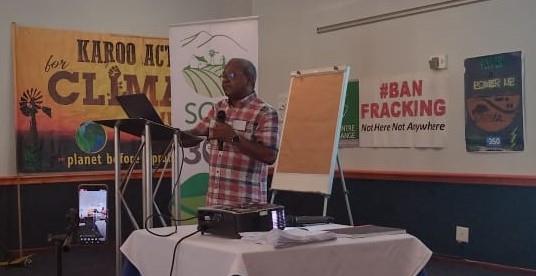KAROO NEWS - The Support Centre for Land Change (SCLC) hosted its second joint Environmental Justice and Producers Platform in Wilderness, from 10 to 13 November.
This platform expanded on the 2022 event when over 70 climate activists and producers gathered in Graaff-Reinet to analyse the impact of climate change on production and the availability of food.
This year the Pietermaritzburg Economic Justice & Dignity Group (PMBEJD) assisted with extending the focus beyond production to address a just transition within South Africa's food system.
Climate impacts on food production
Climate change has severely affected South Africa's food production and availability. Participants highlighted that climate disasters such as droughts, excessive rains and floods, as well as shifting seasons, are significantly disrupting the production cycle.
Environmentally damaging agricultural practices exacerbate these effects by compromising water resources, depleting soil fertility, and disrupting biodiversity, which is critical for sustainable farming. "The adversities are not evenly distributed – vulnerable communities are often disproportionately affected in that they experience the harshest consequences of reduced food production and increased food prices," says Patrick Sambo, director of the SCLC.
South African food system
Despite being self-sufficient in producing nutritious food on a national level, 13,8 million people in South Africa still face food insecurity. Approximately 20% of households live below the food poverty line. Shockingly, investigations revealed 116 child deaths due to severe acute malnutrition in the Eastern Cape between April 2021 and March 2022.
Moreover, over 15 000 severe acute malnutrition cases requiring hospitalisation were reported in 2022. Malnutrition affects the long-term health, education and productivity of children.
Challenges at household level
The problem lies at household level where access to food remains a challenge. Deep-rooted social and economic inequalities within the food system hinder people's access to the means of production such as land, water and agricultural expertise. The market-driven capitalist economy in South Africa prioritises profit over meeting people's demands and needs, affecting affordability and exploiting labour.
PMBEJD Household Affordability Index
According to the PMBEJD Household Affordability Index, 33% of South Africans live below the food poverty line. This index, monitored by lower-income women, revealed a 10,6% yearly increase in the cost of a monthly food basket. In October, the average cost reached R5 297,58, with significant price spikes in essentials like potatoes, eggs, rice and onions. Additionally, the national minimum wage isn't enough to buy even the most basic food basket, leaving many workers struggling to afford food alongside other necessities.
Legislation and rights
The South African food system doesn't align with the constitutional rights that guarantee access to adequate food and water for all citizens, especially children's right to basic nutrition. Presently, there's no legislative framework ensuring food security or a concrete plan for its realisation. Developing such a framework is crucial to address systemic issues and outline government roles in ensuring better food provision.
Addressing climate challenges
Efforts to reduce greenhouse gas emissions through climate change mitigation strategies are crucial in mitigating long-term disruptions to production. It is necessary to implement adaptation measures and address structural inequalities within the food system, from production to consumption, for a more just and equitable food system.
A comprehensive approach considering socio-economic and environmental factors is essential to achieve these goals.
In summary, the recent platform emphasised the urgent need to address climate impacts, systemic inequalities, legislative gaps, and affordability challenges within South Africa's food system to ensure adequate and nutritious food for all its citizens.
 The Dr Beyers Naudé delegation who participated.
The Dr Beyers Naudé delegation who participated.
 Mervyn Abrahams, programme coordinator of PMBEJD, co-facilitated the SCLC combined platform.
Mervyn Abrahams, programme coordinator of PMBEJD, co-facilitated the SCLC combined platform.
‘We bring you the latest Garden Route, Hessequa, Karoo news’
















